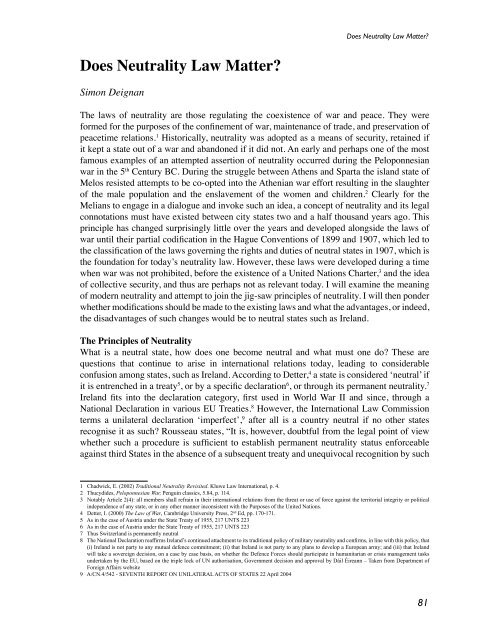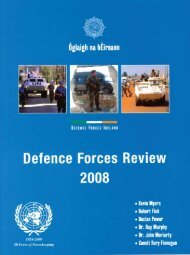Defence Forces Review 2010
Defence Forces Review 2010
Defence Forces Review 2010
Create successful ePaper yourself
Turn your PDF publications into a flip-book with our unique Google optimized e-Paper software.
Does Neutrality Law Matter?Does Neutrality Law Matter?Simon DeignanThe laws of neutrality are those regulating the coexistence of war and peace. They wereformed for the purposes of the confinement of war, maintenance of trade, and preservation ofpeacetime relations. 1 Historically, neutrality was adopted as a means of security, retained ifit kept a state out of a war and abandoned if it did not. An early and perhaps one of the mostfamous examples of an attempted assertion of neutrality occurred during the Peloponnesianwar in the 5 th Century BC. During the struggle between Athens and Sparta the island state ofMelos resisted attempts to be co-opted into the Athenian war effort resulting in the slaughterof the male population and the enslavement of the women and children. 2 Clearly for theMelians to engage in a dialogue and invoke such an idea, a concept of neutrality and its legalconnotations must have existed between city states two and a half thousand years ago. Thisprinciple has changed surprisingly little over the years and developed alongside the laws ofwar until their partial codification in the Hague Conventions of 1899 and 1907, which led tothe classification of the laws governing the rights and duties of neutral states in 1907, which isthe foundation for today’s neutrality law. However, these laws were developed during a timewhen war was not prohibited, before the existence of a United Nations Charter, 3 and the ideaof collective security, and thus are perhaps not as relevant today. I will examine the meaningof modern neutrality and attempt to join the jig-saw principles of neutrality. I will then ponderwhether modifications should be made to the existing laws and what the advantages, or indeed,the disadvantages of such changes would be to neutral states such as Ireland.The Principles of NeutralityWhat is a neutral state, how does one become neutral and what must one do? These arequestions that continue to arise in international relations today, leading to considerableconfusion among states, such as Ireland. According to Detter, 4 a state is considered ‘neutral’ ifit is entrenched in a treaty 5 , or by a specific declaration 6 , or through its permanent neutrality. 7Ireland fits into the declaration category, first used in World War II and since, through aNational Declaration in various EU Treaties. 8 However, the International Law Commissionterms a unilateral declaration ‘imperfect’, 9 after all is a country neutral if no other statesrecognise it as such? Rousseau states, “It is, however, doubtful from the legal point of viewwhether such a procedure is sufficient to establish permanent neutrality status enforceableagainst third States in the absence of a subsequent treaty and unequivocal recognition by such1 Chadwick, E. (2002) Traditional Neutrality Revisited. Kluwe Law International, p. 4.2 Thucydides, Peloponnesian War, Penguin classics, 5.84, p. 114.3 Notably Article 2(4): all members shall refrain in their international relations from the threat or use of force against the territorial integrity or politicalindependence of any state, or in any other manner inconsistent with the Purposes of the United Nations.4 Detter, I. (2000) The Law of War, Cambridge University Press, 2 nd Ed, pp. 170-171.5 As in the case of Austria under the State Treaty of 1955, 217 UNTS 2236 As in the case of Austria under the State Treaty of 1955, 217 UNTS 2237 Thus Switzerland is permanently neutral8 The National Declaration reaffirms Ireland’s continued attachment to its traditional policy of military neutrality and confirms, in line with this policy, that(i) Ireland is not party to any mutual defence commitment; (ii) that Ireland is not party to any plans to develop a European army; and (iii) that Irelandwill take a sovereign decision, on a case by case basis, on whether the <strong>Defence</strong> <strong>Forces</strong> should participate in humanitarian or crisis management tasksundertaken by the EU, based on the triple lock of UN authorisation, Government decision and approval by Dáil Éireann – Taken from Department ofForeign Affairs website9 A/CN.4/542 - SEVENTH REPORT ON UNILATERAL ACTS OF STATES 22 April 200481
















